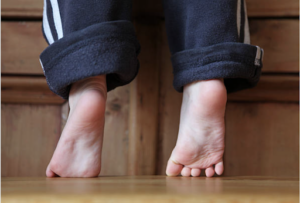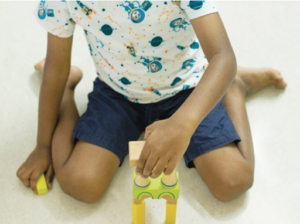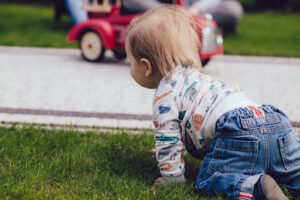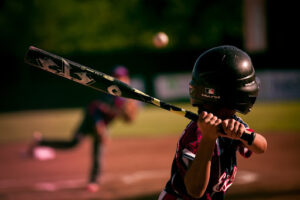
In this post, we are going to discuss the strange term “torticollis,” how it can be impacting your infant, and how parents and physical therapists can help treat this and aid in your infant’s physical development.

In this post, we are going to discuss the strange term “torticollis,” how it can be impacting your infant, and how parents and physical therapists can help treat this and aid in your infant’s physical development.

What is toe walking?
Toe walking can be described as walking on the toes or the balls of our feet without heel contact on the ground. It commonly can be described as your child always on their “tiptoes”. Some children with diagnoses such as cerebral palsy, muscular dystrophy, or autism may be seen walking on their toes. If a child is toe walking for an unknown cause, it can be described as idiopathic toe walking. Idiopathic toe walking is characterized by toe walking that is not occurring because of an underlying anatomical or neuromuscular cause. Factors that may play into idiopathic toe walking include;

The weather is getting colder and the leaves are starting to change colors which means it’s fall here in Chicago! These activities are perfect for outdoor play, as well as indoor play that will help promote gross motor development for your child’s balance, strength, coordination, and motor planning skills. These activities will have your child FALLing in love with all things FALL!
What are gross motor activities and why are they important?
Gross motor activities are important for your child’s development and mobility which include crawling, walking, jumping, running, stairs, throwing, and kicking. These skills are seen throughout the development of your child as they gain more strength and mobility! Gross motor development is essential to your child’s physical well-being as well as their social and emotional growth. Creating activities that promote strengthening, balance, coordination, and motor planning are ways you can help your child meet these developmental milestones in your own home or in the community!
Check out some of these gross motor activities that your child can enjoy this fall!

What is “Container Baby Syndrome?”
Container Baby Syndrome is a “collection of movement, behavioral, and other problems caused by a baby or infant spending too much time in a container-any commonly used piece of baby equipment that resembles a container.” While this may sound intimidating, Container Baby Syndrome is highly preventable and there are many ways parents and caregivers can help children develop while avoiding this!

When watching your child play you may have noticed them sitting in a peculiar way. Looking from above you will see their little legs form the shape of a “W”. But what should you do when you see your child sitting in this position?

Why is crawling such a big deal? What if my child doesn’t seem interested in crawling? These are all common questions that are brought up by parents. Crawling is much more than just a means of mobility. It provides a child with some important strengthening, coordination, and cognitive benefits that will help them much later than the baby and toddler years.

The crowd goes wild! Your child has just swung and hit their first home run! They run around the bases and go to touch home plate. Your child is showered with high-fives from teammates on the left and right. Among other things, in order for your child to have successfully swung and hit a home run, run around the bases, and give high-fives to his teammates, your child would have to have done one really important thing… cross midline! The ability to cross midline and interact with all areas of our environment is an important skill for all of us to learn. Let’s explore!

Do you ever find yourself comparing your child to their peers at the park or playground? Or maybe even comparing them to their older sibling? Do you feel like they are behind with their motor skills? What truly is “age appropriate”? In this post, we will cover age-appropriate milestones from age 1 to 5 years and what to do if your child isn’t hitting their milestones on time.

You may have heard the strange medical term “torticollis” from your pediatrician, neighbor, or friend. Frankly, it can be overwhelming and quite confusing to understand. In this post, we will review what torticollis is, reasons why babies may develop a torticollis, what parents can look for if they have concerns, associated impairments if left untreated, and tips on ways to prevent torticollis.